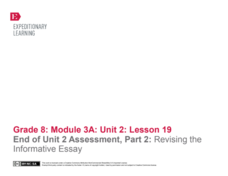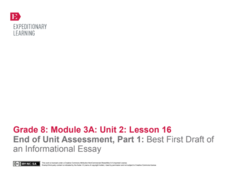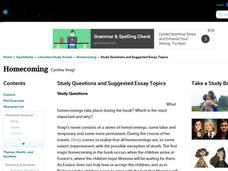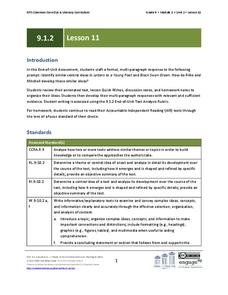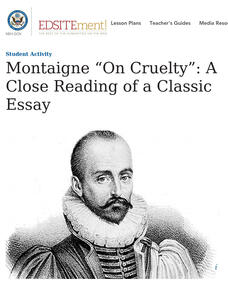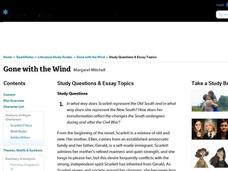EngageNY
End of Unit 2 Assessment, Part 1: Drafting The Argument Essay
Scholars write the draft of their essays about Atticus's decision to defend Tom Robinson in Harper Lee's novel To Kill a Mockingbird. They support their claims with reasons, details, and quotes from the novel.
EngageNY
Writing an Argumentative Essay: Planning the Essay
A self-assessment helps scholars take ownership of their learning. Using the resource, pupils begin a Writing Improvement Tracker to develop awareness of their writing strengths and challenges. Next, they complete worksheets to plan...
Scholastic
Lesson 3: Essay Organizer
A three-minute exercise warms-up scholars' writing abilities in order to follow a writing process that ends in an essay. The essay's topic is a barrier and the values used to break it. Four steps include choosing a topic,...
EngageNY
End of Unit Assessment, Part 1: On-Demand Essay “What Makes A Hurricane A Natural Disaster?”
It's time to refine writing and word choice. Learners work on Part 1 of their end of unit assessment by creating an essay titled What Makes a Hurricane a Natural Disaster? They use glossaries and graphic organizers from previous...
EngageNY
End of Unit 2 Assessment, Part One: First Draft of Analysis Essay
How do writers use evidence from literary texts to support analysis and reflection? With instructional activity 17 of 20 from the Grade 8 ELA Module 1, Unit 2 series, learners gather resources to prepare for an end-of-unit assessment....
EngageNY
Writing an Argument Essay: Planning the Essay
Preparation is the key to success. With the help of an informative resource, scholars complete a writing improvement tracker to identify their writing strengths and challenges. They also meet with partners to plan an argumentative essay...
EngageNY
Planning the Introductory and Concluding Paragraphs of the End of Unit Assessment Essay
Preparation is the key to success! Using the guiding resource, scholars plan their end-of-unit analytical essays' introductory and concluding paragraphs based on their reading of Inside Out & Back Again. To prepare, they complete a...
EngageNY
Analyzing the Model Essay: Studying Argument
Scholars begin writing an argument essay based on Shakespeare's A Midsummer Night's Dream. They read and analyze a model essay, considering the author's thinking before writing it.
EngageNY
Writing an Argument Essay: Planning the Essay
Pupils use a helpful resource to begin a Writing Improvement Tracker, developing awareness of their writing strengths and challenges. Additionally, they continue planning their argument essays about Shakespeare's A Midsummer Night's...
EngageNY
End of Unit 2 Assessment, Part 2: Revising the Informative Essay
Is that your final answer? Scholars discuss the terms, edit, and revise. They then complete their final drafts as the end-of-unit assessment of Unbroken. Writers use their graded draft essays from a previous instructional activity to...
EngageNY
Writing and Argument Essay: Peer Critique with Rubric (Chapters 29-31, Including Synthesis of Scenes in Previous Chapters)
Hungry? Try a quote sandwich! Writers discover the concept of using a quote sandwich to introduce and analyze a quote in an argumentative essay properly. Additionally, pupils engage in peer critiques, analyzing each other's drafts and...
EngageNY
End of Unit 2 Assessment, Part 2: Revise Essay Drafts
Positive feedback is a great way to improve writers' skills. Scholars receive their draft essays back with teacher comments and start the revision process. Next, they prepare to begin their final drafts at home.
EngageNY
Writing an Argument Essay: Evaluating the Model and Crafting a Claim
Pupils prepare to write argumentative essays based on Shakespeare's A Midsummer Night's Dream. They begin weighing evidence and crafting claims for their writing about control.
EngageNY
End of Unit 2 Assessment, Part 1:Drafting the Argument Essay
An informative resource instructs pupils on how to write their essay drafts about the theme of control in Shakespeare's A Midsummer Night's Dream. Next, scholars complete an Exit Ticket, listing their three favorite characters from the...
EngageNY
End of Unit Assessment, Part 1: Best First Draft of an Informational Essay
This is just the beginning. Learners take the first step toward their end-of-unit assessments of Unbroken. They use their tools and knowledge gained from the unit to create first drafts of their informational essays. Writers then respond...
Spark Notes
For Whom The Bell Tolls by Ernest Hemingway: Study Guide - Essays
Included here are three short study questions and five essay topics for the novel For Whom The Bell Tolls. Consider using these in an upcoming final assessment, but also remember that many high schoolers use SparkNotes to prepare for...
Spark Notes
His Dark Materials by Philip Pullman: Study Guide - Essays
SparkNotes is popular for a reason! It provides tons of information, and even for teachers, there is useful information on this website. Respond to eight short answer and essay questions about Philip Pullman's trilogy of His Dark...
Spark Notes
Homecoming by Cynthia Voigt: Study Guide - Essays
Use an online interactive literature instructional activity to test comprehension and critical understanding of the book, Homecoming. Learners respond to eight short answer and essay questions about Cynthia Voigt's novel. Answers to...
EngageNY
Grade 9 ELA Module 1, Unit 2, Lesson 11
As an end-of-unit assessment, class members craft a formal, multi-paragraph essay identifying a similar idea found in Rainer Maria Rilke's collection, Letters to a Young Poet, and David Mitchell's Black Swan Green. Writers state and use...
National Endowment for the Humanities
Montaigne “On Cruelty”: A Close Reading of a Classic Essay
An excerpt from Michel de Montaigne's essay "On Cruelty" provides advanced readers an opportunity to polish their close reading skills. Scholars read the passage twice and then respond to the provided questions.
EngageNY
Analyzing the Structure and Content of an Essay to Inform
Outlines are a great asset to essay planning. Scholars read and analyze a model essay about the importance of daily reading and consider how it would look in an outline format. Next, they outline their own informative essays about rules...
EngageNY
Planning for Writing: Introduction and Conclusion of a Literary Analysis Essay
First and last impressions are important. Using the helpful resource, scholars draft the introductory and concluding paragraphs of their literary analysis essays. Next, they use a writing evaluation rubric to self-assess their work.
EngageNY
Grade 9 ELA Module 2, Unit 3, Lesson 5
After rereading the full text of Walter Mosley's essay "True Crime," groups complete an evidence collection tool worksheet, and then class members independently draft a multi-paragraph, evidence-based response that identifies how Mosley...
Spark Notes
Gone with the Wind by Margaret Mitchell: Study Guide - Mini Essays
In this online interactive literature learning exercise, students respond to 9 short answer and essay questions about Margaret Mitchell's Gone with the Wind. Students may check some of their answers online.
Other popular searches
- Essay Writing
- Compare and Contrast Essay
- Five Paragraph Essay
- Expository Essays
- Descriptive Essay Writing
- Essay on Children's Day
- Argumentative Essay Writing
- Compare & Contrast Essays
- Descriptive Essay
- Cause and Effect Essay
- Narrative Essays
- Five Paragraph Essay Writing









